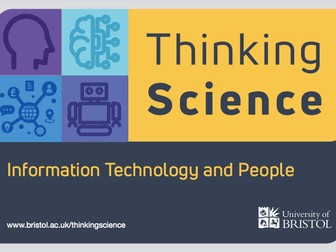Thinking Science: Information Technology and People
The Thinking science resources come in the form of questions designed to provoke thinking and discussion on topics including physics, biology, chemistry, information technology, and working scientifically. They can be used to consolidate and extend core curriculum knowledge and understanding, as well as to engage and enrich students’ critical thinking skills. The resources link to the KS3 National Curriculum.
Our latest resources explore topics such as the self online; artificial intelligence; the grid; and robots. The activities and question sections are designed around these themes, guiding students’ and teachers’ on fruitful discussions on how these technologies impact our knowledge and understanding of the world, human behaviour, and how we understand intelligence.
Artificial Intelligence (AI) can play games, recognise faces, translate languages and much more. AI makes important decisions previously made by humans,
for example, whether to approve someone for a bank loan, or whether someone has a medical condition. AI learns from huge amounts of information that humans provide through their online behaviour. This information is used in big data systems. We already interact with AI and big data systems every day, for example, recommender systems make personalised suggestions of videos on YouTube and decide which items to present on social media. Soon people will start interacting with AI controlled robots that have access to lots of data about them. We rarely stop to consider these systems but they are radically
changing the world and how we behave and think.
